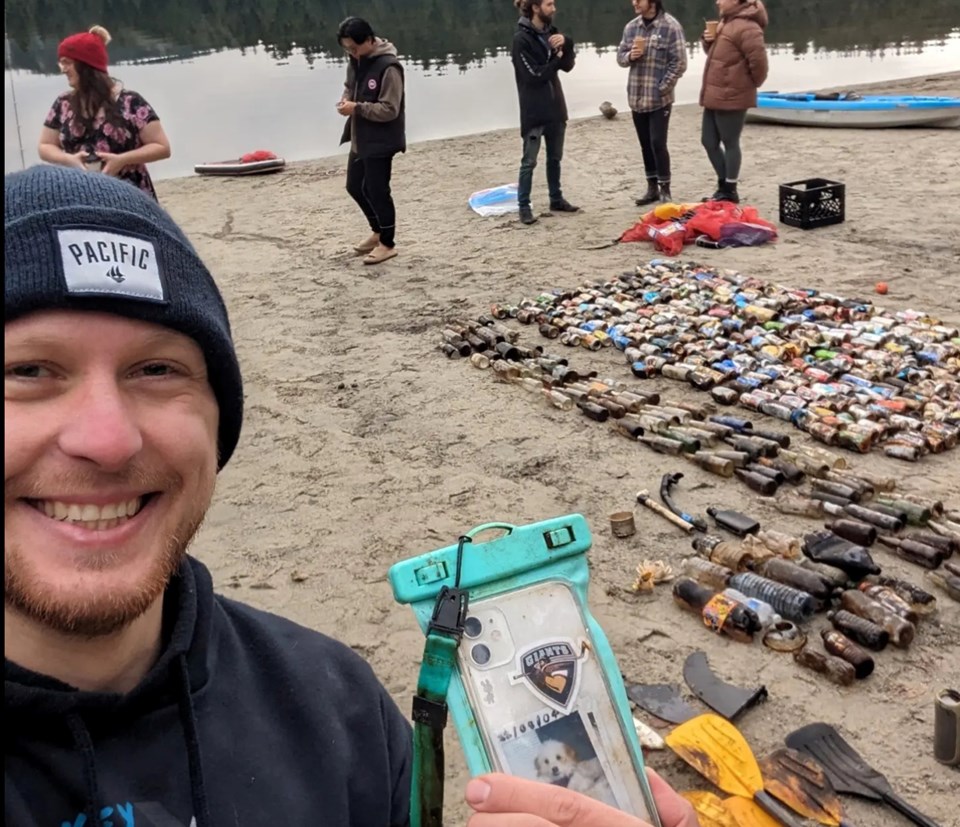A recent clean up of Sasamat Lake by volunteer scuba and free divers yielded 144 pounds of trash — including a working cell phone that was eventually reunited with its owner.
Clay Helkenberg, a diving enthusiast from Chilliwack who goes by the handle Aquatic Monkey on various social media platforms, led the effort that was part of his ongoing quest to educate people to take greater care with their trash and personal items when enjoying local lakes and other bodies of water.
“Through the cleanups we do, I post about them on social media to bring awareness to the issue of pollution in our local waterways and the impacts they can have on aquatic life,” Helkenberg told the Tri-City News, adding items like boat motors and generators can be particularly harmful to the marine environment as they corrode and eventually leak fuel and oil into the water.
Helkenberg said his clean-up dives of lakes, rivers, canals and harbours, from Kelowna to Tofino, have recovered thousands of bottles and cans, hundreds of sunglasses, dozens of hi-tech devices like phones, a drone and even a GoPro camera that had been submerged in Cultus Lake for a decade after it had been lost by its owner while cliff diving.
Helkenberg said he documents his recovery dives on his YouTube channel because that’s where he got the inspiration for his own personal mission, watching videos of other divers doing clean-up dives all over the world.
But until the onset of the COVID-19 pandemic in 2020, he said he just never had the time to get out there and try to make a difference.
Getting laid off from two jobs because of the public health crisis gave Helkenberg that time.
“It was a productive activity that got me outside and away from the public,” he said.
Helkenberg started meeting other divers doing clean-ups on their own and they began working together in waterways like Cultus Lake and the Vedder Canal in Chilliwack, Harrison Lake, Burrard Inlet at Deep Cove and False Creek in Vancouver.
They also brought in sponsors to help offset costs for gear, gas money, snacks and prizes.
Helkenberg said the dive at Sasamat Lake — north of Port Moody — presented some challenges as the water was cold and visibility limited by sediment on its bottom that would get stirred up by every movement.
As a result, the volunteer divers who ranged from newbies to the sport to certified instructors stayed in fairly shallow water up to about 70 feet.
“We wanted to keep it safe,” Helkenberg said. “It’s just trash at the end of the day.”
Boxes of doughnuts
One of the divers, Henry Wang, said in his own video of the dive that boxes of doughnuts helped them keep warm in the cold water.
“The water’s really cold, so this increases the water temperature by one degree,” Wang said as he passed around the sweet treats, adding the trash in Sasamat Lake seemed to occur in clusters.
As each diver emerged from the water, trailing a satchel and even a plastic kayak — or “trashak” — filled with their finds behind them, the trash was laid out in orderly groups on the sands of White Pine Beach for counting.
The haul produced 544 cans, 79 bottles, several paddles, sunglasses and swim goggles, two pairs of underwear, a small Buddha figurine and the phone, enclosed in a teal-coloured waterproof case affixed with a Vancouver Giants sticker along with a couple of photos of a small white dog with an apparent underbite and the possible name of “Smelly Ellie.”
Using investigative techniques honed through dozens of previous efforts to reunite recovered phones and other devices with their owners, Helkenberg was able to figure out what social media channels the phone’s owner favoured and posted the photos of the dog there.
When that didn’t yield a result, he extracted the owner’s phone number from the phone’s SIM card and got in touch.
Within just a few days, the phone was back in the pocket of its owner and Helkenberg was rewarded with some Timbits and a donation to support his group’s clean-up dives.
More importantly, though, he got to meet Smelly Ellie the dog.
Helkendberg said it’s just such little successes that continue to drive him forward.
“I definitely take great joy in this part,” he said.
But the big picture is never far from Helkenberg’s thoughts.
“It would be a bit naive to think I could clean all the waterways with trash,” he said. “I’m hoping to inspire others to take greater care with the environment.”



